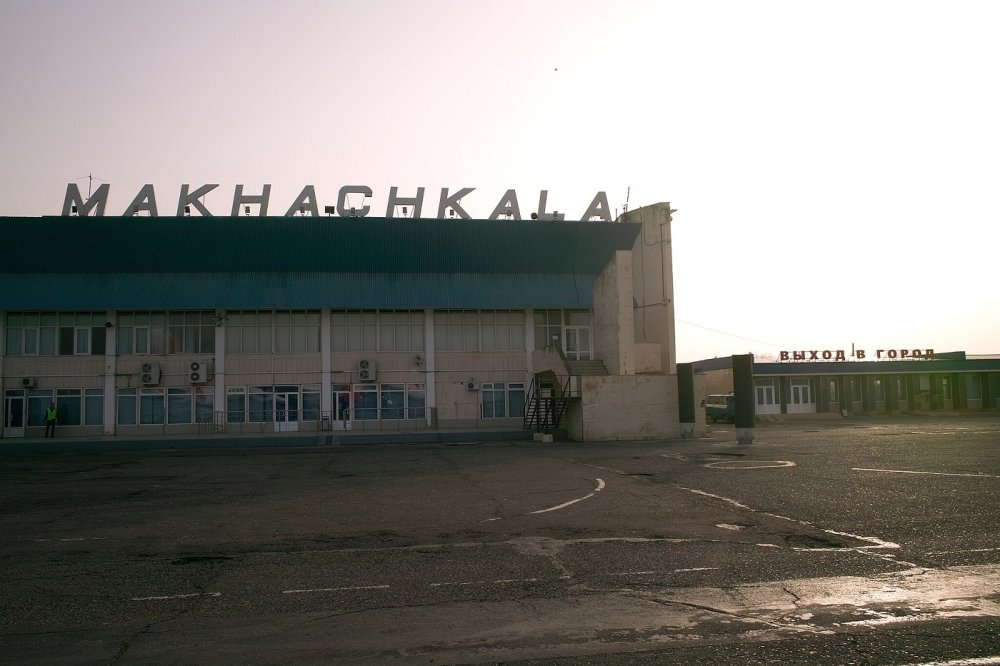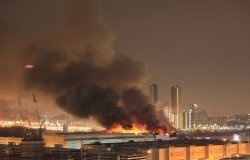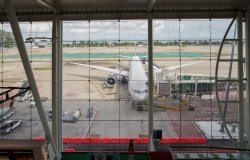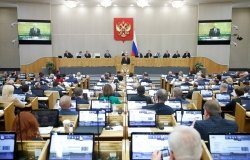
A blog of the Kennan Institute
Sowing Seeds of Hatred, Reaping Pogroms

An incident at the Makhachkala airport can hardly be called anything other than a pogrom. On Sunday, October 29, a commercial flight took off from Tel Aviv to Makhachkala, the capital city of the Russian region of Dagestan. The plane was supposed to land at 7 pm. Even before the plane’s arrival, local Telegram channels of murky origin published calls to go to the airport and hunt for Jews. The posts’ authors suggested not assaulting anyone but just demanding an answer to the question: “Do you condemn Israel’s actions”?
Incredibly, Putin and other government officials have attributed the incitement of hatred against Jews to the United States. In fact, hatred has been fueled by the Russian authorities themselves. Over the past 20 months, the Kremlin has been churning out enemy narratives nonstop. The policymakers in the Kremlin have demonstrated a longstanding confusion regarding the justifications for the war in Ukraine, resorting to a familiar tactic of fomenting animosity against various groups, including independent politicians, journalists, LGBTQ+ individuals, foreign nationals, and, now, Jews.
This is one of many posts on the Telegram-channel Utro Dagestan (blocked right now): “They committed outrages in the land of the Prophets. They opened nightclubs, discos, and held the world’s largest Gay Pride parades, which numbered 200 thousand participants! And these former classmates and neighbors of ours in Makhachkala and Derbent decided to return to warm and cozy Dagestan, to live happily and to participate in informational lies, talking about 40 slaughtered babies! We tell you, do not come to Dagestan! Go to Birobidzhan!”
Birobidzhan is a town in Siberia, near the Russia-China border. It is the center of the Jewish Autonomous Oblast, established in the late 1920s as a Jewish homeland. The Bolsheviks’ idea was to bring more people to the sparsely populated Far East, and to divert Soviet Jews from the Zionist project. For this reason, the official language of the Jewish Autonomous Oblast is Yiddish, not Hebrew. The authorities attempted, with little success, to relocate to this remote patch of land Jews from Ukraine, Belarus, parts of Russia proper, and other Soviet republics. Today, people of Jewish descent constitute less than one percent of the oblast’s population.
A Chain of Pogroms in Russia
Over the last few days, Telegram channels like Utro Dagestan emphasized the suffering of the Muslims of Gaza, while calling the brutal Hamas attack on Israel a lie. The Dagestani “avengers,” numbering several hundred went to the airport, where they blocked the exits from the building, lashed out at random passers-by, demanded a show of passports and interrogated the passengers. Police forces did not initially respond.
On Saturday, indignant citizens gathered in Cherkessk (in the Russian region of Karachay-Cherkessia), demanding that Jews be expelled from the city. Then an antisemitic gathering took place in Khasavyurt (Dagestan): people came to the hotel where, in their opinion, “refugees from Israel” were staying. A similar spontaneous rally took place in Makhachkala. The very next morning, Sunday, in Nalchik (Kabardino-Balkaria), unknown persons set fire to the Jewish Cultural Center under construction, writing “Death to the Yahuds” on the wall.
At the beginning of the raid, when frightened customs officers, airport employees, and passengers, both Jews and non-Jews, watched the mob on the runways, influential media people commented on what was happening as if they were witnessing not a pogrom but public festivities, perhaps without direct approval, but with understanding. The head of Russia Today TV Margarita Simonyan, reposted comments from Jihad channel: “Brothers, the bus with the Jews has left and is now standing in the center of Avdiivka” (Avdiivka is the Ukrainian town which the Russian army has been struggling to occupy).
During the first hours a paradoxical situation developed. Propaganda seemed to condemn the incident in Makhachkala, but on the other hand considered it acceptable to giggle about it. This ambiguity is characteristic and revealing. After all, whose side is the Russian state on?
Half-Partnerships No Longer Fly
From the very beginning of the war, after the monstrous attack by Hamas on Israeli civilians, we did not hear a single word of empathy from Vladimir Putin; he was silent for several days. And when he spoke, the world heard nothing but accusations against the United States.
At a time when Israel faced the worst catastrophe since the Holocaust, official Russia looked the other way. But this is understandable. After February 24, 2022, half-partnerships do not exist. Israel is on the other team, while Hamas chose Russia out of all foreign countries to visit during the early days of the war against Israel.
There they are, the Hamas Politburo member Abu Marzuk and the Deputy Foreign Minister and Special Representative of the Russian President Mikhail Bogdanov in the picture. The militants’ press release states that “aggression against Gaza” was discussed in Moscow and emphasizes the right to “resist the Zionist occupation by all available means.” And, of course, gratitude: “the movement’s delegation highly appreciated the position of Russian President Vladimir Putin and the efforts of active Russian diplomacy.” The day before the visit, Russia and China rejected a proposal to add an amendment to the UN resolution condemning Hamas.
Sunday’s events will be remembered by many for the photograph of pogromists looking for Jews in the plane’s turbine. Miraculously, none of the passengers were injured. But all those who found themselves in the airport on that fateful evening will have enough impressions for many years to come.
The rioters were driven out by the security forces after a few hours. To do this police had to shoot in the air. The Times of Israel source claimed that several Jews who arrived on the ill-fated flight were taken into protective custody and were apparently sent to Moscow. The remaining passengers on the plane were Russians, including families of Dagestanis. As of Monday, nine police officers had been injured in the clashes and 60 riot participants detained. The head of Dagestan, Sergei Melikov, said that “no one should escape responsibility.” He also pointed to the organizer, and so did other officials, including Putin.
Putin’s Twisted Logic
The organizers are “external forces”: the United States, Ukraine, Zelensky. “You need to understand where the spider is that is trying to entangle the whole planet, the whole world, in its web,” says Putin, meaning Washington. A spider that has entangled the whole world in its web is a common antisemitic meme.
If for a moment we try to get the gist of what Putin is saying, we arrive at the following. Kyiv is ruled by fascists, against whom the Russian army is waging a heroic “special operation.” Those fascists were installed in their government positions by the Americans after the 2014 coup d’état they organized in Ukraine. Later, these same Americans started a war in the Middle East. That is, they persuaded Hamas to attack Israel and mercilessly, demonstratively, kill 1,400 people. But wait! Hamas is, after all, a friend of Iran and Russia, not the United States. Not to mention the “unexpected” fact that it was not America that attacked Ukraine after all. Putin’s conspiracy theory looks pathetic.
The Pogroms’ Possible Origins
But if we try to analyze the pogroms, putting aside the Kremlin’s conspiracy theories, possible reasons for them boil down to two alternatives. It could be a deliberate provocation by the authorities or a spontaneous surge of antisemitism. Some experts and observers believe that the Kremlin staged the pogroms in order to demonstrate its support for its friends in Palestine and to ride the anti-Israeli wave, to become a leader of the global south.
But it is difficult to imagine that the Kremlin would shoot itself in the foot by fanning passions in the explosive North Caucasus. And besides, what about Prigozhin’s rebellion? After all, here is the proof: surprises are possible in Russia, the system is not bulletproof, and the security forces often fail to respond to unpredictable challenges. I am convinced that Putin does not need internal destabilization, and the storm at the Makhachkala airport came as a surprise to him.
The North Caucasus is a special world, complex and explosive. The failure to apply general rules to it has led to Putin now reaping the rewards, not only in the form of an attack on the airport, but also in the form of rallies with posters proclaiming “We don’t want Jews living next to us.” Hatred towards “others,” which the Kremlin has been so diligently nurturing over the past two years, inevitably undermines the system of power. And in such a shaky system, both a Prigozhin riot in June and anti-Jewish protests in Makhachkala in October are possible. More could follow.
The opinions expressed in this article are those solely of the author and do not reflect the views of the Kennan Institute
See our newest content first.
Subscribe to receive the latest analysis from the Russia File
About the Author


Kennan Institute
The Kennan Institute is the premier US center for advanced research on Russia and Eurasia and the oldest and largest regional program at the Woodrow Wilson International Center for Scholars. The Kennan Institute is committed to improving American understanding of Russia, Ukraine, Central Asia, the Caucasus, and the surrounding region though research and exchange. Read more










